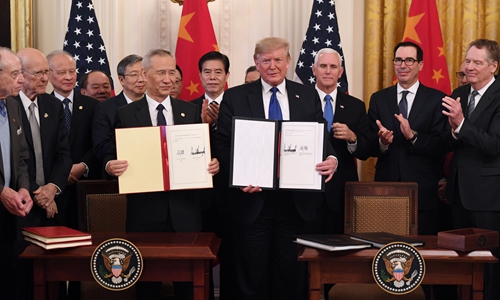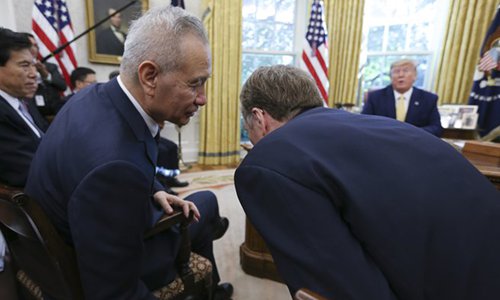Phase one deal to stabilize China-US ties
Chinese Vice Premier Liu He and US President Donald Trump show the signed documents after they ink a trade agreement between China and the US in the White House in Washington DC on Wednesday morning (US time). Photo: AFP
After China and the US signed their phase one economic and trade agreement in the White House on Wednesday, their relations have stabilized and been prevented from getting worse, and created a friendly atmosphere for the phase two negotiations that include tougher issues, Chinese experts said on Thursday. They said that China should be cautiously optimistic as US strategic pressure against China will remain unchanged.
Speaking at the signing ceremony, Chinese Vice Premier Liu He, also a member of the Political Bureau of the Communist Party of China Central Committee and chief of the Chinese side of the China-US comprehensive economic dialogue, first conveyed a message from Chinese President Xi Jinping to US President Donald Trump, the Xinhua News Agency reported.
Diao Daming, an expert on China-US relations at Renmin University of China, told the Global Times on Thursday that the signing showed the two sides have tried their best to include as much as they could in the deal, and both China and the US want to ensure that these consensuses are inked as soon as possible.
"The agreement could prevent China-US ties from deteriorating to some extent, but there is no guarantee that those ties would return to the era before the trade war," Diao noted.
For his part, Trump called the signing of the phase one agreement a "milestone," and a "boon to the US, China and the whole world." Describing China as a great nation, Trump also expressed his admiration for Xi's wisdom and leadership.
Relations between the US and China are very important, said the US president, stressing that the two sides are working together closely in economy and trade, along with a wide range of other areas, which will help promote world peace and prosperity.
Trump also said he looks forward to another visit to China in the foreseeable future.
Almost all members of the Trump administration and hundreds of senior politicians, officials and representatives from different sectors of the US attended the ceremony. The high-profile arrangement shows the Trump administration desperately needs the deal to balance domestic pressure and place the economy back on track, Lü Xiang, a research fellow on US studies with the Chinese Academy of Social Sciences in Beijing, told the Global Times.
Chinese Vice Premier Liu He speaks with US Trade Representative Robert E. Lighthizer during a meeting with President Donald Trump in the Oval Office of the White House on October 11, 2019 in Washington, DC. Photo: IC
Possible changes
Mei Xinyu, a research fellow at the Chinese Academy of International Trade and Economic Cooperation, told the Global Times on Thursday that though the phase one deal was signed, uncertainties and risks remain and China must be prepared to deal with possible changes.
Trump is unlikely to unilaterally break the agreement and create more uncertainties on trade before the 2020 presidential election, Diao said. "Democrats and his domestic opponents will attack the deal, but unlikely to make a significant impact."
Democrats could say the Trump administration made too many compromises to China as the opening-up of its financial market and the protection of intellectual property are actually good for China's long-term development and reform, so these can't be regarded as a US victory, Diao noted.
"While some Chinese people believe China has made concessions, many US elites would also believe Trump is the one who has made significant compromises. A deal that could hardly satisfy everyone is a good one that could be implemented rather than overthrown," Diao noted.
Chinese analysts also warned that if Democrats take power, China could face more difficult and complicated challenges, so at this moment, both sides should just try to stabilize trade ties as much as possible. Otherwise, uncertainties in the future could make the situation worse or more unpredictable.
US strategic pressure on China on issues like Xinjiang, Hong Kong and Taiwan will mostly remain but after the struggles in the trade war, US policymakers will realize that pressure won't make China surrender and the US also needs to pay the price. Lü said these pressures are useless to contain China's development, so the pressures on China might be reduced.
Big enough market
The phase one trade agreement is in line with established international rules and will not affect China's trade relations with other partners, Chinese officials and analysts said on Thursday.
Asked about the impact of the deal on other countries, Liu He said the agreement will not hurt the interests of other countries.
"There were two important conditions during the negotiation process: First, it will not hurt a third party; second, it will have to be in line with WTO rules," Liu said, China Media Group reported.
Liu said China's increase of US imports will be based on market principles and consumer demand in China, so the deal will not impact the interests of third parties.
As part of the phase one trade agreement, China agreed to increase its purchase of US agricultural, manufacturing, energy and other products by $200 billion on top of the total imports of $186 billion in 2017.
Following the agreement, some have raised concerns that countries that have seen big jumps in exports of those products to China during the trade war may be impacted.
But Chinese analysts said that the vast Chinese market will be able to take in more US goods, while not driving down imports from other trading partners. The trade agreement, which marks a pause in the US-launched trade war that has dragged on global economic growth, will benefit all rather than hurt anyone else.
"The Chinese market is big enough," Mei said. He said it was the US that did not gain more through the trade war because China was going to further open up its market anyway. 
